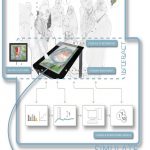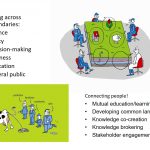
The Impact Node, led by Deltares, will integrate technical knowledge on river-sea systems (including water, subsurface and infrastructure) – generated by DANUBIUS-RI – with governance and policy-making to solve problems in highly complex dynamic river-sea systems. This Node has the primary focus of developing and testing concepts, methods and instruments to realize this goal. Methods and instruments may be focused, for example, on accelerating design and decision making (e.g. by using a decision theatre), improving quality and decreasing the costs of spatial planning in river-sea systems. Methods and instruments may also focus on how to better cope with uncertainties in decision making processes, how to involve stakeholders (e.g. in knowledge co-creation), and on spanning the boundaries between the different science disciplines involved in DANUBIUS-RI (e.g. by the development of a common language).
Methods and instruments developed will help to transfer and apply knowledge in practice to deal with issues in highly complex dynamic river-sea systems. This relates to the second aim of the Impact Node i.e. to connect to, and actually transfer, scientific outputs from DANUBIUS-RI to those committed to and engaged in the sustainable management of river-sea systems – or parts thereof – as well as to strengthen business in this area.
There is no growth without innovation, no innovation without knowledge. Innovative ideas develop when nurtured by knowledge; mature technology can be brought onto the market. Supported by the scientific output of the Hub, other Nodes and Supersites, the node aims to innovate and transfers the DANUBIUS-RI knowledge, products, services and spinoffs to the business sector (small and medium enterprises as well as larger organisations). As knowledge grows, so too does the economy.





